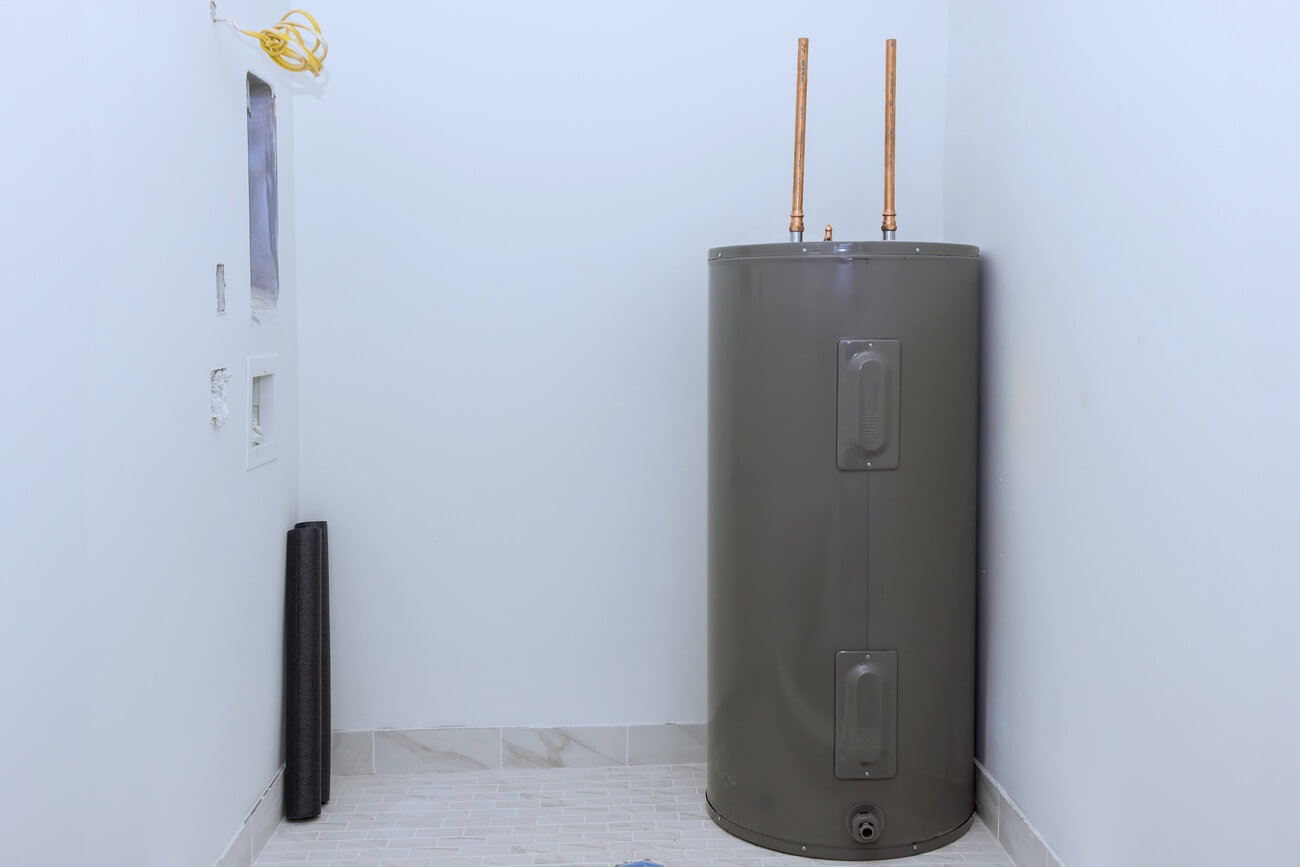Understanding Different Fuel Sources: Electric vs. Gas Water Heater Replacement
- Home
- What to Do in Case of Water Leak Emergency
Recent Posts
- Your Hot Water Smells Like Rotten Eggs? Causes and Solutions for Sulfur Odor in Water Heaters
- How to Do a Gas Line Pressure Test: Steps, Precautions & Safety
- Aluminum or Magnesium Anode Rod for Water Heater: Which to Choose
- Top 5 Common Water Heater Problems in Older Homes and How to Diagnose Them
- When to Use Snaking vs. Hydro Jetting for Effective Drain Cleaning
Dinomite Services

When replacing a water heater, homeowners first decide whether to go with an electric or gas water heater. This choice can significantly affect both your utility bills and overall convenience. While both options serve the same purpose—providing a reliable hot water source—their operation, energy efficiency, installation, and cost differences mean each has unique advantages and disadvantages. In this guide, we’ll break down the pros and cons of electric vs. gas water heaters to help you decide which option best fits your home.
What’s the Difference Between Electric and Gas Water Heaters?
Electric and gas water heaters primarily differ in fuel source and heating mechanism. Electric water heaters rely on electricity to power heating elements within the tank, heating water as needed. On the other hand, gas water heaters use natural gas or propane and a burner at the bottom of the tank to heat water. Each type has unique characteristics that affect everything from initial installation costs to monthly utility bills and maintenance.
Pros and Cons of Electric Water Heaters
For those considering electric water heater replacement, understanding the strengths and limitations of this option is essential.
Advantages of Electric Water Heaters
- Energy Efficiency: Electric water heaters are generally more energy-efficient because they don’t lose heat through venting like gas heaters. All the energy is directed into heating the water, reducing waste.
- Lower Initial Costs: The initial cost of an electric water heater is often lower, making it a more budget-friendly option for homeowners who need a quick replacement.
- Ease of Installation: Electric models are easier to install because they don’t require venting or gas lines. This can also make the installation process faster and less invasive.
- Safety: With no combustion or gas leaks to worry about, electric heaters are safer for homes without existing gas connections.
Disadvantages of Electric Water Heaters
- Higher Operating Costs: Electricity tends to cost more than natural gas, so electric water heaters can be more expensive to operate over time, especially in colder climates where hot water demand is higher.
- Slower Heating Times: Electric water heaters often take longer to heat water than gas models, which might be better for large households with high hot water demands.
Pros and Cons of Gas Water Heaters
If you’re thinking about gas water heater replacement, weighing the unique benefits and drawbacks of this type of heater is helpful.
Advantages of Gas Water Heaters
- Faster Heating Times: Gas water heaters typically heat water faster, benefiting families with higher hot water needs.
- Lower Operating Costs: Natural gas is usually cheaper than electricity, meaning gas water heaters tend to have lower monthly operating costs.
- Effective for Large Households: Because of their quick recovery rate, gas water heaters are well-suited for large families or homes with multiple bathrooms.
Disadvantages of Gas Water Heaters
- Higher Installation and Maintenance Costs: Gas water heaters require venting systems and sometimes complex installation processes. They also need regular maintenance to ensure proper venting and safe operation.
- Heat Loss and Energy Efficiency: Since gas water heaters vent hot gases, they lose some energy produced, making them slightly less efficient than electric models.
- Safety Concerns: Gas heaters require careful installation and ongoing maintenance to avoid gas leaks, which can be a risk if not properly managed.
Factors to Consider When Choosing Between Electric and Gas Water Heaters
Both electric vs. gas water heaters have compelling reasons to consider, but your choice will depend on various factors. Here are some essential aspects to weigh as you make your decision:
Utility Costs in Your Area
Electricity and natural gas prices vary by location. In areas where electricity is more affordable than natural gas, the operating costs for an electric water heater may be less significant. On the other hand, if natural gas is cheaper, a gas water heater could offer lower ongoing costs.
Hot Water Demand
Gas water heaters may provide better performance for larger families or homes with heavy hot water use, as they heat water faster. However, if hot water demand is moderate, an electric water heater can meet your needs while offering greater energy efficiency.
Environmental Impact
If environmental sustainability is a concern, it’s worth noting that electric water heaters can be powered by renewable energy sources like solar or wind power. Conversely, gas water heaters rely on fossil fuels, which produce greenhouse gases. However, newer high-efficiency gas models are designed to minimize emissions.
Installation Space and Requirements
Gas water heaters require space for venting, which may be challenging in some home setups, especially apartments or condos. Electric water heaters, by contrast, are easier to install in small spaces due to their more straightforward requirements.
Maintenance Needs of Electric vs. Gas Water Heaters
Understanding the maintenance needs of each type can help you make an informed decision:
- Electric Water Heater Maintenance: Electric models generally require minimal maintenance, with tasks like checking the heating elements and cleaning sediment from the tank once a year.
- Gas Water Heater Maintenance: Gas models need regular venting, burners, and gas connection inspections. Cleaning and inspecting the venting system periodically are essential for safe operation.
Choosing the Right Water Heater Replacement for Your Home
Deciding on the best electric vs. gas water heater for your home comes down to factors like installation cost, ongoing operating expenses, household hot water demands, and environmental considerations. Both options have benefits, so selecting the ideal water heater replacement requires balancing your budget, energy efficiency preferences, and convenience. Consulting with water heater technicians can also provide valuable guidance to ensure you choose the right fit for your home’s needs.
Expert Help with Water Heater Replacement
Replacing a water heater is a significant investment, and choosing between an electric or gas model can make a big difference in comfort, safety, and monthly utility costs. Whether you’re leaning towards an electric water heater replacement or a gas water heater replacement, our team at Dinomite Services is here to help. We have the expertise to guide you through the process, from assessing your home’s unique needs to installing the new water heater quickly and efficiently. Contact us today to discuss your options and ensure you choose the right solution for your hot water needs!

